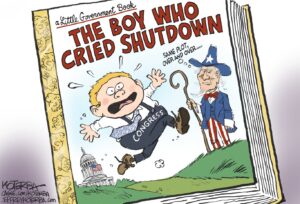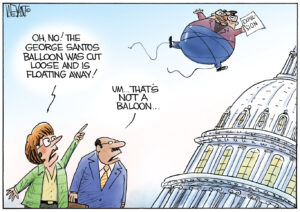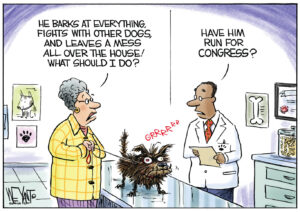Whom to Blame for the Shutdown? How About Ourselves?
With a political process skewed to ensure the re-election of incumbents, and low voter turnout in midterm congressional primaries and elections, we have a system ripe for exploitation. And so it has been. Yet we do nothing to try to change it.
So the government is shut down, the inmates are in charge of the congressional insane asylum, and most of the media look like the Scarecrow from “The Wizard of Oz” pointing evenly in opposite directions as they place blame.
But finding fault at the bottom of this mess is easy: It’s the conservative wing of the Republican Party in Congress, something that polls show the vast majority of Americans recognize. Only a quarter support the tea partyers’ budget stance, according to a recent Washington Post/ABC News poll. More broadly, the public generally thinks Congress is doing one crappy job.
And this is where the real blame lies — in ourselves, and in our failure as a body politic to end gerrymandering. With the major political parties setting the ground rules for the geographical shape of congressional districts (the process follows each decennial census), they ensure that incumbents face easy re-election by gaming the system through amoeba-shaped districts that collect the optimum number of voters for each respective party. So the only real elections at the congressional level are often the party primary, in which very few people vote. Which means minority extremists like the tea party, with some organization and the help of a compliant media that fails to call out lunacy when it sees it, can seize control of the U.S. Congress. Or at least enough of it to shut down the U.S. government.
And when congressional general elections come around every other November, so few voters care — especially in races in which the presidency isn’t up for grabs — that turnout hovers a little above one-third of eligible voters.
These are the folks who control who goes to Washington, from Michele Bachmann to Steve King. As Elizabeth Drew points out in The New York Review of Books, this is the central failure of our democracy:
The midterms, with their lower turnout, reward intensity. In 2010, the Republicans were sufficiently worked up about the new health care law and an old standby, “government spending,” particularly the stimulus bill, to drive them to the polls in far larger numbers than the Democrats. A slight upward tick in turnout numbers can have a disproportionate impact in Congress and many of the states, and therefore the country as a whole. The difference in turnout caused such a change in 2010; in fact, the Republicans gained sixty-three House seats and took control of both the governorships and the legislatures in twelve states; the Democrats ended up with control of the fewest state legislative bodies since 1946. The midterms go a long way toward explaining the dismaying spectacle in Washington today. State elections bear much of the responsibility for the near paralysis in Congress thus far this year and the extremism that has gripped the House Republicans and is oozing over into the Senate.
The difference in the turnouts for presidential and midterm elections means that there are now almost two different electorates. Typically, the midterm electorate is skewed toward the white and elderly. In 2010 the youth vote dropped a full 60 percent from 2008. Those who are disappointed with the president they helped elect two years earlier and decide to stay home have the same effect on an election as those who vote for the opposition candidate.
Little wonder, then, that there can be such a gulf between the president and Congress, particularly the House of Representatives…
And between the House and the American public at large. That is how the Constitution designed it, so that the House members would be most responsible to the people in their districts, who get to judge them every two years. But with the two major parties’ cynical approach to reapportionment, what we have is a gamed system, and one — as we’ve seen — susceptible to hijacking by political extremes.
—Posted by Scott Martelle.
Your support matters…Independent journalism is under threat and overshadowed by heavily funded mainstream media.
You can help level the playing field. Become a member.
Your tax-deductible contribution keeps us digging beneath the headlines to give you thought-provoking, investigative reporting and analysis that unearths what's really happening- without compromise.
Give today to support our courageous, independent journalists.






You need to be a supporter to comment.
There are currently no responses to this article.
Be the first to respond.